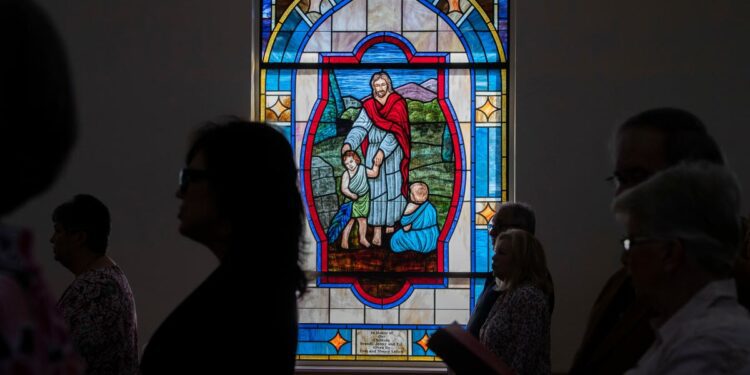Wesleyan Covenant Association meets after new Methodist denomination launch
The Wesleyan Covenant Association, the main organization behind the formation of the new “traditionalist” Methodist denomination, met May 6-7, 2022 just outside Indianapolis.
Liam Adams and Mykal McEldowney, Nashville Tennessean
Splintering in the United Methodist Church following disagreements over theology and church policy — including dealing with LGBTQ+ rights — fueled exodus of thousands of churches.Many congregations that disaffiliated joined a more conservative, breakaway denomination called the Global Methodist Church, which just officially formed with inaugural general conference.Global Methodist Church appoints bishops and adopts constitution, among other foundational steps to erect a framework for a traditionalist alternative to UMC.
An ongoing struggle to define Methodist values and its worldwide membership reached an inflection point with a breakaway denomination gathering for its inaugural legislative assembly, an event that sought to erect a framework for a more conservative alternative to the United Methodist Church.
The Global Methodist Church, a group that formed out of the UMC as part of a splintering, held its convening general conference in Costa Rica last week and adopted policies to replace an interim infrastructure with a permanent one. More than 300 delegates adopted a constitution and elected six interim bishops, among other leaders, to help usher the church in these early stages of its life.
More than 7,500 churches left the largely Nashville-based UMC between 2019-2023 through a process called disaffiliation following disagreements over theology and church policy — including dealing with LGBTQ+ rights. The Global Methodist Church preemptively launched in 2022 to provide a home in a moment of urgency as congregations disaffiliated from the UMC and were uncertain where to turn next.
With last week’s convening general conference, that looser network of doctrinally aligned congregations, now exists within a full-fledged church hierarchy that will seek to preserve a more orthodox brand of Methodism. It’s also better positioned to vie for congregations outside the U.S. that are potentially up for grabs.
“We are going to be global,” the Rev. Mark Webb, a Global Methodist bishop, said in a Sept. 20 sermon during an opening worship service for the convening general conference. “Actually, let’s just say it: we are global.”
Despite U.S. churches with a high concentration in the South and Midwest comprising most of the Global Methodist Church, the new denomination’s messaging and branding has sought to appeal to a stronghold of conservative Methodists in other countries, where the culture and laws are much stricter regarding LGBTQ+ rights.
The Global Methodist Church is among the top 20 denominations in the U.S. with more than 4,733 churches at the time of its formation, according to Christianity Today. Christianity Today reported the denomination is bigger than other conservative groups that splintered off from mainline Protestant denominations, such as the Presbyterian Church in America and the Anglican Church in North America.
The UMC, which is the nation’s largest mainline Protestant denomination, has sought to maintain its fellowship with churches in Africa and the Philippines, among others, through a plan to restructure the denomination and give more autonomy to regional United Methodist authority. That plan, called regionalization, received initial approval at the UMC General Conference earlier this year in Charlotte, where the policymaking body also reversed decades-old anti-LGBTQ+ restrictions on ordination and blessing same-sex unions.
But there has only been more unrest since then, with the Cote D’Ivoire Conference leaving the UMC. Then, Nigerian bishop John Wesley Yohanna left the UMC by resigning from his post, escalating an ongoing factional conflict between supporters of Yohanna and that of Yohanna’s former assistant, the Rev. Ande Emmanuel, who supports remaining in the UMC. Some Nigerian churches that support Yohanna tried to leave with their bishop, but UMC leadership blocked those exits by deeming a meeting among those churches invalid.
The UMC Council of Bishops then dispatched retired bishop Rev. John Schol to help manage the fallout, a move that’s further agitated some United Methodists in Nigeria.  As for Yohanna, the Nigerian bishop joined the Global Methodist Church and did so with enough time to attend the last week’s convening general conference in Costa Rica.
Yohanna briefly preached in a Sept. 20 opening worship service for the Global Methodist Church.
“Our witness is bold, our witness is compelling and fearless,” Yohanna said. “Our mission advances when individuals, when people become disciples of Jesus Christ.”
Aftermath of UMC General Conference: How United Methodists across the US are responding to historic policy changes
Traditionalist advocates become breakaway group’s top leaders
Despite its central role in the formation of the Global Methodist Church, conflict over sexuality or about United Methodist bureaucracy were minimally discussed at the assembly in Costa Rica.
“I bless those who have been our adversaries in this journey because I believe that’s what we’re called to do. We will remain focused on the future and not look back,” the Rev. Keith Boyette, a Virginia pastor and outgoing chief executive for the Global Methodist Church, said in an Sept. 25 address. “I pray that those who find a different way would choose that same path and not continue the conflict we endured. But that’s their choice.”
Global Methodist leaders honored Boyette at the general conference for Boyette’s many years of advocacy for a home for traditionalist Methodists, first by leading an advocacy group within the UMC called the Wesleyan Covenant Association and then by serving as Global Methodist Church’s transitional administrative head.
“We are a stronger movement because we had to move into the wilderness,” said Boyette, who officially retired with the conclusion of last week’s general conference.
The Global Methodists’ lack of discussion about issues like sexuality, though there’s widespread consensus about that topic within this new traditionalist denomination, was due to necessary decisions on more fundamental policies. Â
Prior to last week’s general conference, the Global Methodist Church had almost no bishops to help lead the denomination and no permanent set of policies and stated beliefs. The convening general conference put much of that into place. In addition to the continued service of two existing bishops, the Revs. Mark Webb and Scott Jones, who stepped into Global Methodist leadership in 2023 following their resignations from the UMC, Global Methodist Church delegates elected six new interim bishops.
Among those nominated and elected to bishop were former United Methodist pastors who played a key role in the movement advocating for churches to leave the UMC. Â
In fact, one of those newly elected interim bishops, the Rev. Carolyn Moore, was a top leader for the Wesleyan Covenant Association and pastors a church that was part of a class action lawsuit against the UMC’s North Georgia Conference over disaffiliation disputes. Moore told The Tennessean in a December 2023 interview after her church successfully disaffiliated that she was focused on moving forward, a sentiment she reiterated in a Sept. 27 social media post about last week’s general conference.
“That is my experience of this convening conference of the Global Methodist Church as it comes to a close or more accurately, ushers in a beginning…Not just ‘good tired’ but emptied and swept away,” Moore said on social media. “It may take a minute to find my feet again, but when I do, I will walk back down this mountain with this beautiful congregation called the GMC and together we will get to work.”
Latest with UMC leadership: United Methodist bishops set, steady leadership sought for U.S. church after splintering
Creating a ‘culture’ of orthodoxy
In contrast to the many legislative battles on specific policies at the UMC General Conference that fueled the recent splintering, the Global Methodist Church’s convening general conference dealt with broad strokes for ordering the life of the church.
“We are going to create a culture where accountability in our discipleship is a part of every aspect of our lives,” Webb said in his Sept. 20 sermon. “A church, a movement that is in ministry with and to all people. Do not believe the narrative the Global Methodist Church hates certain groups of people.”
Except for a few sentences spelling out certain views — such as the belief in a “monogamous marriage between one man and one woman,” according to the Global Methodist Church’s newly adopted Book of Doctrines and Discipline — the new denomination’s governing documents upholds a traditionalist worldview through a broader set of policies.
For example, the denomination’s newly adopted constitution includes a clause barring the general conference in the future of the authority to “revoke, alter, or change our doctrinal foundations as established by the Church and embodied within our normative standards.”
Another example is the high bar set for educating future ministers in the Global Methodist Church. Previously, theological education was another point of contention as part of the larger conflict in the UMC in which traditionalists argued many of the UMC’s 13 official theological schools and other approved institutions were too liberal. As a result, a higher concentration of traditionalists attended certain conservative leaning seminaries. It’s those seminaries which are among the Global Methodist Church’s list of approved institutions for its future ministers to attend.
At last week’s general conference, Global Methodist delegates debated whether to loosen standards for approving seminaries. David Watson, a delegate and administrator at United Theological Seminary in Ohio, opposed loosening standards. Ultimately, a majority of delegates agreed with Watson and voted against a proposed amendment to the standards, leaving the approval process exclusively in the hands of the denomination’s commission on ministry.
“My concerns for this conference, and all the legislation I committed to it, is to maintain our Methodist identity,” Watson said during a Sept. 25 floor debate. ”And what I would hope the commission on ministry would do is identify schools to help us to preserve a Methodist and evangelical and orthodox vision of the Christian faith among our clergy.”
Related: How United Methodist seminaries are navigating uncertain future as denomination splinters
Liam Adams covers religion for The Tennessean, part of the USA TODAY Network. Reach him at [email protected] or on social media @liamsadams.
Source link : http://www.bing.com/news/apiclick.aspx?ref=FexRss&aid=&tid=66fca774137943e0b6f5895506495c8e&url=https%3A%2F%2Fwww.tennessean.com%2Fstory%2Fnews%2Freligion%2F2024%2F09%2F30%2Fglobal-methodist-church-forms-and-holds-first-general-conference%2F75367138007%2F&c=3031079989779987470&mkt=en-us
Author :
Publish date : 2024-09-29 23:07:00
Copyright for syndicated content belongs to the linked Source.












